SideLines, June 2007
Peoples Archive Ltd., a company based in
the United Kingdom, has taken on the challenge of interviewing and filming great "thinkers, creators, and achievers" around the world - leaders in many areas of art, science, and society generally.
Registered subscribers at Peoples Archive have more viewing options, but even non-subscribers with relatively slow internet connections can enjoy using this site.
John Maynard Smith's interview includes a segment entitled "An exercise in futility' in which he describes having to translate an English version of Virgil back into Latin, at school. The mathematical-biologist-to-be turned the 'futile' effort into an experiment in working with permutations and combinations.
Research fields currently represented by the interviews are:
Biochemistry
Biology
Chemistry
Computer Science
Immunology
Mathematics
Physics
About the Research Cooperative:
For free membership and full access to publish and modify Notices, please register:
Registration/Log-in
Sunday, June 10, 2007
Friday, May 11, 2007
Australian Education
SideLines, May 2007
Australia may be 'Down Under' but 'Higher Education' is a regular supplement in The Australian, a major newspaper. Here is a sample of article headlines from the 10 page February 14, 2007, issue:
Revamp for flawed ratings - describes an overhaul of the way Australian universities measure teaching quality.
Chancellor intervenes in VC's dispute - reports on a dispute between past and present vice-chancellors at Macquariee University.
Crooked paths to Learning - an almost anthropological analysis of how some students (in the real world) act as 'interest chasers' (rather than following unreal study and career plans that are imagined by the university employment counselling services) about which there is 'a general ignorance' among students.
Drop in federal research funding... and academic staff continue to be (substantially) outnumbered by general administrative staff.
Unable to stay the course - science, maths and language courses are imploding in Britain... the anxiety in Australia over maths and science skills is shared in Britain.
Push for increase in foreign fellows - currently the Federation of Australian Scientific and Technological Societies limits foreign nationals to just five of the 25 fellowships awarded each year.
and much more, including many higher education job advertisements.
All our forums are open for reading. For free membership and full access to write and modify Notices, please register:
Registration/Log-in
Australia may be 'Down Under' but 'Higher Education' is a regular supplement in The Australian, a major newspaper. Here is a sample of article headlines from the 10 page February 14, 2007, issue:
Revamp for flawed ratings - describes an overhaul of the way Australian universities measure teaching quality.
Chancellor intervenes in VC's dispute - reports on a dispute between past and present vice-chancellors at Macquariee University.
Crooked paths to Learning - an almost anthropological analysis of how some students (in the real world) act as 'interest chasers' (rather than following unreal study and career plans that are imagined by the university employment counselling services) about which there is 'a general ignorance' among students.
Drop in federal research funding... and academic staff continue to be (substantially) outnumbered by general administrative staff.
Unable to stay the course - science, maths and language courses are imploding in Britain... the anxiety in Australia over maths and science skills is shared in Britain.
Push for increase in foreign fellows - currently the Federation of Australian Scientific and Technological Societies limits foreign nationals to just five of the 25 fellowships awarded each year.
and much more, including many higher education job advertisements.
All our forums are open for reading. For free membership and full access to write and modify Notices, please register:
Registration/Log-in
Sunday, April 08, 2007
Science Writers
SideLines, April 2007
The (USA) National Association of Science Writers was created in 1934 by a dozen science jouralists and reporters in New York City. The aim of the organization was to improve the craft of science journalism and to promote good science reportage. The NASW incorporated in 1955, pledging itself to "foster the dissemination of accurate information regarding science through all media normally devoted to informing the public." [Wikipedia, 8th April 2007). See www.nasw.org
Recommended: A FIELD GUIDE FOR SCIENCE WRITERS
2nd edition, Oxford University Press, 2005. Deborah Blum
Mary Knudson, and Robin Marantz Henig (eds).
All our forums are open for reading. For free membership and full access to write and modify Notices, please register:
Registration/Log-in
The (USA) National Association of Science Writers was created in 1934 by a dozen science jouralists and reporters in New York City. The aim of the organization was to improve the craft of science journalism and to promote good science reportage. The NASW incorporated in 1955, pledging itself to "foster the dissemination of accurate information regarding science through all media normally devoted to informing the public." [Wikipedia, 8th April 2007). See www.nasw.org
Recommended: A FIELD GUIDE FOR SCIENCE WRITERS
2nd edition, Oxford University Press, 2005. Deborah Blum
Mary Knudson, and Robin Marantz Henig (eds).
All our forums are open for reading. For free membership and full access to write and modify Notices, please register:
Registration/Log-in
Sunday, March 25, 2007
The Oxytocin Factor
SideLines, March 2007
A recent article in the Observer reports that College (University) graduates who are really smiling and happy at graduation are likely to live longer, and have more successful marriages. The article links their happiness with the measurable surge in oxytocin, the 'bonding' hormone, that occurs when kindnesses are given and received.
In other words, close physical proximity can help people develop happy and trusting relationships. This does not bode well for writers, editors and translators who work far apart and depend on long-distance communications.
Perhaps there are optimum distances and optimum frequencies of direct personal contact for every kind of human relationship, including those strange relationships where we trust others with the results of our deepest, inner intellectual efforts.
The present Research Cooperative is designed to be international in scope, but at the same time, we should also encourage at least occasional direct contact between research writers, editors, and translators - at the local and regional levels - so that happier and more fruitful working relationships can be established.
The equivalent of a trusting handshake is not easy to accomplish by words alone.
Anyone can read our forums, but for free membership and full access, please register at http://www.researchco-op.co.nz
A recent article in the Observer reports that College (University) graduates who are really smiling and happy at graduation are likely to live longer, and have more successful marriages. The article links their happiness with the measurable surge in oxytocin, the 'bonding' hormone, that occurs when kindnesses are given and received.
In other words, close physical proximity can help people develop happy and trusting relationships. This does not bode well for writers, editors and translators who work far apart and depend on long-distance communications.
Perhaps there are optimum distances and optimum frequencies of direct personal contact for every kind of human relationship, including those strange relationships where we trust others with the results of our deepest, inner intellectual efforts.
The present Research Cooperative is designed to be international in scope, but at the same time, we should also encourage at least occasional direct contact between research writers, editors, and translators - at the local and regional levels - so that happier and more fruitful working relationships can be established.
The equivalent of a trusting handshake is not easy to accomplish by words alone.
Anyone can read our forums, but for free membership and full access, please register at http://www.researchco-op.co.nz
Saturday, February 03, 2007
Student Services in Japan
 SideLines, February 2007
SideLines, February 2007The Japan Student Services Organization (JASSO) is responsible for managing student loans and scholarships as an "Indpendent Administrative Agency" (Int. Herald Tribune, 9th Jan. 2007). This means it has balance its own books and somehow be profitable, although its mandate is to provide interest-free or low-interest loans to students.
Despite the fact that student numbers are falling throughout Japan - because of demographic decline (low birthrates) - the number of students seeking loans has been increasing.
According to the article, tuition fees are still rising. Why not cut fees and cut lending at the same time? And provide scholarships for parents who wish to return to their studies after having children?
With a wider range of encouragements, student numbers might eventually stop declining, and a healthier research and teaching system could be nurtured in Japan.
Anyone can read our forums, but for free membership and full access, go here:
Registration/Log-in
Monday, January 08, 2007
A new forum for science writing
SideLines, January 2007
Best wishes for the New Year.
A new forum for science writing has been added to the Research Cooperative (see main menu on left, at the site).
The purpose of this forum is to support contact between science writers and publishers.
Offers and requests for science writing services can be made by science writers, and book, journal, magazine, and newspaper publishers.
For further enquiries, contact Dr Peter Matthews (see details at foot of this page)
For free Co-op membership and use of our forums, please go to Registration/Log-in
Best wishes for the New Year.
A new forum for science writing has been added to the Research Cooperative (see main menu on left, at the site).
The purpose of this forum is to support contact between science writers and publishers.
Offers and requests for science writing services can be made by science writers, and book, journal, magazine, and newspaper publishers.
For further enquiries, contact Dr Peter Matthews (see details at foot of this page)
For free Co-op membership and use of our forums, please go to Registration/Log-in
Saturday, December 02, 2006
Higher Education a Human Right?
SideLines, December 2006
Etsuko Akuzawa in the Asahi Shimbun (26th July 2006) reported on discussions in Japan about the current high cost of university (college) education, and the failure of the government to fulfill a 27-year old commitment to make universities free.
According to Usui of Kyoto Tachibana University, "If society paid for education, university graduates would feel a greater obligation to serve society".
I agree, and the present Co-op website is my own personal attempt to return something, not just to New Zealand but to societies worldwide, since I have been a beneficiary of higher education in four different countries.
Sato, of Ryukoku University also said that "The right to receive higher education is a basic human right...we should seek [to provide] free college education here in Japan."
Obviously, there are practical limitations to what different countries can provide, according to economic circumstances, but there is no reason why Japan could not provide a free higher education, instead of providing welfare for construction companies and using precious natural resources for unnecessary infrastructure.
Etsuko Akuzawa in the Asahi Shimbun (26th July 2006) reported on discussions in Japan about the current high cost of university (college) education, and the failure of the government to fulfill a 27-year old commitment to make universities free.
According to Usui of Kyoto Tachibana University, "If society paid for education, university graduates would feel a greater obligation to serve society".
I agree, and the present Co-op website is my own personal attempt to return something, not just to New Zealand but to societies worldwide, since I have been a beneficiary of higher education in four different countries.
Sato, of Ryukoku University also said that "The right to receive higher education is a basic human right...we should seek [to provide] free college education here in Japan."
Obviously, there are practical limitations to what different countries can provide, according to economic circumstances, but there is no reason why Japan could not provide a free higher education, instead of providing welfare for construction companies and using precious natural resources for unnecessary infrastructure.
Wednesday, November 15, 2006
Online libraries, and more
SideLines, November 2006
Copyright issues, technical glitches and set up costs have not stopped more and more books going online. Many organisations are putting libraries online. Important players at the moment include: Google Book Search, Open Content Alliance, Windows Live Search Books, and Gallica.
So many sources we have for downloading! And now the One Laptop Per Child Initiative is planning to give children in many countries the chance to upload as well as download.
When the whole world begins to upload, what will happen?
Perhaps that is when we will know the the real significance of the browser wars of today. Will browsers of the future be wide-open windows or half-closed shutters?
Archives, addition, and access. These are keywords for knowing the world through the internet. Hopefully, we will still have time to tend to our own gardens (real and metaphorical), and learn from direct experience.
Copyright issues, technical glitches and set up costs have not stopped more and more books going online. Many organisations are putting libraries online. Important players at the moment include: Google Book Search, Open Content Alliance, Windows Live Search Books, and Gallica.
So many sources we have for downloading! And now the One Laptop Per Child Initiative is planning to give children in many countries the chance to upload as well as download.
When the whole world begins to upload, what will happen?
Perhaps that is when we will know the the real significance of the browser wars of today. Will browsers of the future be wide-open windows or half-closed shutters?
Archives, addition, and access. These are keywords for knowing the world through the internet. Hopefully, we will still have time to tend to our own gardens (real and metaphorical), and learn from direct experience.
Please send comments to our Viewpoints forum or Weblog (above), or contact Peter, c/o The Research Cooperative (NZ): pjm (at) gol (dot) com). Thank you.
Sunday, October 08, 2006
Cab Call and Taxi Stand
 A driver with this kind of taxi might not have a lot of time for research or writing, but many drivers around are potential, active, or retired university students, researchers, professionals in various trades, writers, editors, translators, and so on.
A driver with this kind of taxi might not have a lot of time for research or writing, but many drivers around are potential, active, or retired university students, researchers, professionals in various trades, writers, editors, translators, and so on.So the Research Cooperative invites participation by taxi drivers who are looking for another kind of work to fill in time between customers, or for days off the road. At the same time, two complementary blog sites have been created:
- Cab Call Mobi (stories about using taxis), and
- Taxi Stand Mobi (practical information about taxi services)
Photo: Hanoi, 2006
Tuesday, October 03, 2006
Museums are not just archives
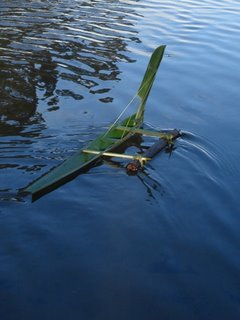 SideLines, October 2006 (A cross-posting from New Zealand Science History) As in other countries, museums in New Zealand are not just archives or places for storing old things - they are also centres of research, and many are also historical centres of research. Many of the old things kept at museums are important records of early research in New Zealand (e.g. in collections of early letters, photographs, publications, plants, animals, rocks, and a huge range of cultural materials).
SideLines, October 2006 (A cross-posting from New Zealand Science History) As in other countries, museums in New Zealand are not just archives or places for storing old things - they are also centres of research, and many are also historical centres of research. Many of the old things kept at museums are important records of early research in New Zealand (e.g. in collections of early letters, photographs, publications, plants, animals, rocks, and a huge range of cultural materials).As venues for exhibition, museums are able to present the results of research in ways that are accessible for people from all areas of society. They are able to juxtapose old materials and new materials so that we can see how the world around us has been changing, over time.
Over the last hundred years or so, exhibitions have had an important role in the development of research in New Zealand. Research is never important in itself - it is only important if it it is effectively expressed in scientific journals, in newspapers or magazines, in school and university courses, in the continuous development of many different industries, and in exhibitions. Developng an exhibition can be a stimulus for new directions in research, as well as providing a venue for presenting the results of previous research.
At Auckland Museum, the representation of human scientific efforts extends to the 'prehistoric' period (before writing) - with a display showing how the earliest settlers from the tropical Pacific explored and came to understand the natural environment and resources that existed in temperate New Zealand.
Some of the the oldest museums in New Zealand are located in Auckland, Wellington, Whanganui, Christchurch, and Dunedin. Are there old museums in other places in New Zealand? Information from our readers would be welcome (plese click on the link for comments, below).
Photo: experimental toy canoe made from flax, as part of preparation for an exhibition on Vaka Moana (opening at Auckland Museum, December 2006)
Thursday, August 31, 2006
All may register
SideLines, September 2006
Actually, a spam attack on our forums has forced us to require that all forum contributors register.
So you may - and you must - register to post messages and replies in the Co-op forums. Registering is not difficult and is still free (use the Registration link in the main menu, near the top).
Reading and using information from the forums is completely open to everyone. Our aim has always been to communicate offers and requests - for language services, for research - as openly and widely as possible.
To express any opinion about this matter, please use our Viewpoints column (see the website), or contact Peter, c/o The Research Cooperative (NZ): pjm (at) gol (dot) com). Thank you!
Actually, a spam attack on our forums has forced us to require that all forum contributors register.
So you may - and you must - register to post messages and replies in the Co-op forums. Registering is not difficult and is still free (use the Registration link in the main menu, near the top).
Reading and using information from the forums is completely open to everyone. Our aim has always been to communicate offers and requests - for language services, for research - as openly and widely as possible.
To express any opinion about this matter, please use our Viewpoints column (see the website), or contact Peter, c/o The Research Cooperative (NZ): pjm (at) gol (dot) com). Thank you!
Tuesday, August 01, 2006
Kids may miss the wood of science....
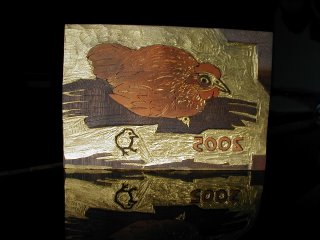 SideLines, August 2006
SideLines, August 2006Kids may miss the wood of science if they are only shown the trees of maths, physics and chemistry.
The Asahi Newspaper of Japan recently ran the following headline in their English edition: "Firms take roadshows to schools to prove science is fun: Companies fear falling interest in science and math will leave them short-staffed in global rivalries" (July 2006).
Here is a list of all the companies and industries mentioned in the article, from first to last: Kyowa Hakko Kogyo Co. (pharmaceutical & biochemical manufacturing), Biofrontier Laboratories (biotechnology), Bayer Japan Ltd (medicines), NEC Corp (electronics), Matsushita Electric Industrial Co. (electronics), IBM Japan Ltd (computers). The Japan Chemical Industries Association is sponsoring chemistry competitions in Japan.
How depressing! Young students should be introduced to the full universe of natural, social and physical sciences... through everyday opportunies in school and outside school. They need chances to learn from parents and teachers, in settings that encourage an organic and gradual development of scientific understanding.
Putting just a few selected school kids into pressure cookers designed for specific areas of science will fail to catch the interest of many potential thinkers.
All students - regardless of their apparent academic level - deserve opportunites to discover and follow their own personal scientific interests. This can be done by putting science into the curricula of all subjects taught in schools.
Give art students oportunities to learn about the chemistry of pigments, and give science students art lessons to teach them some tricks of observation.
Encourage students to test their abilities and stretch their imaginations, in any field, and of all kinds of science will naturally follow.
To express any opinion about this matter, please use our Viewpoints column (link above) or contact Peter, c/o The Research Cooperative (NZ): pjm (at) gol (dot) com).
Monday, July 03, 2006
The literary heritage of science
 SideLines, July 2006
SideLines, July 2006 William Rees-Mogg (Yomiuri Shimbun, 2nd July 2006) boldly declares that the 'United Scholars" of England are fighting back to raise support for museums, libraries and archives for the preservation of books and literary heritage.
He notes that although the English language is England's largest and most sucessful export, there is still a need to defend the preservation of important book collections that illustrate England's literary and scientific heritage (including for example, the Macclesfield Library of Scientific Books).
If the UK with all its experience and wealth cannot properly preserve its scientific heritage, what can other nations do?!
How well preserved is scientific heritage in India, China, Japan, or - perhaps more importantly - in countries that are only just beginning to develop their own modern scientific history?
Scientific writers in the past can help educate writers of the present and future... not just through the record of results but also through the play of ideas over time. Good scientific writing can be a pleasure to read even if the information is obsolete, and even the worst writing can become valuable - as an illustration of how not to write.
To express any opinion about this matter, please use the comments link below, or contact Peter, c/o The Research Cooperative (NZ): pjm (at) gol (dot) com.
Photo: an ornamental banana in Thailand, June 2006 (PJM). While bananas are best known as fruit plants, banana plants can have many different uses, depending on species and variety. Some kinds of banana have been used as fibre sources for cloth or paper.
Monday, June 12, 2006
Back up and write on
SideLines, June 2006
 Musicians encourage the speakers at the start of a research conference in Chiang Mai, Thailand, in June.
Musicians encourage the speakers at the start of a research conference in Chiang Mai, Thailand, in June.
How many individual scientists, research facilities and universities have all their computer records (digital archives) backed up at a distant mirror site?
It may seem an obvious and feasible requirement among wealthy universities in wealthy countries, but in many parts of the world, there is probably very little real security for records that are stored at one physical location, even if there are multiple copies at that location.
Most active writers are keenly aware of the need to back up manuscript files frequently, and at more than one location. One benefit of sending out drafts for review is that the circulating copies can serve as distant back-up copies if disaster strikes (disk failure, theft, fire etc.).
Getting an almost-finished paper safely to an editor or other person should allow the writer to sleep more easily - and there is nothing better than a good sleep to discover that a paper has major holes and needs drastic repairs.
For any enquiries about this site, please contact Peter, c/o The Research Cooperative (NZ): pjm (at) gol (dot) com).
 Musicians encourage the speakers at the start of a research conference in Chiang Mai, Thailand, in June.
Musicians encourage the speakers at the start of a research conference in Chiang Mai, Thailand, in June.How many individual scientists, research facilities and universities have all their computer records (digital archives) backed up at a distant mirror site?
It may seem an obvious and feasible requirement among wealthy universities in wealthy countries, but in many parts of the world, there is probably very little real security for records that are stored at one physical location, even if there are multiple copies at that location.
Most active writers are keenly aware of the need to back up manuscript files frequently, and at more than one location. One benefit of sending out drafts for review is that the circulating copies can serve as distant back-up copies if disaster strikes (disk failure, theft, fire etc.).
Getting an almost-finished paper safely to an editor or other person should allow the writer to sleep more easily - and there is nothing better than a good sleep to discover that a paper has major holes and needs drastic repairs.
For any enquiries about this site, please contact Peter, c/o The Research Cooperative (NZ): pjm (at) gol (dot) com).
Tuesday, May 02, 2006
Synchronicity
SideLines, May 2006
Consider the following stories.
"Liberal economist Galbraith dies at 97... In 1999, a panel of judges... picked "The Affluent Society" [for] its list of the century's best English-language works of nonfiction.... Galbraith's prose won admiration at the very top"
and then, in the same issue of The Japan Times (1st May, 2006)
"Professor plagiarized overseas paper... A Nihon University accountant has plagiarized ideas from a ...research paper published... in the 1950s, a university official said Saturday... The professor, who has authoured numerous books on accounting and bookkeeping, has declined to reply to an enquiry...".
 Co-op comment: The contrast is sad, and makes Japanese research look pitiful, but think again - the entire world is plagued with plagiarism!
Co-op comment: The contrast is sad, and makes Japanese research look pitiful, but think again - the entire world is plagued with plagiarism!
See:
"The so-called 'secret spy dossier' published last week by the [British] Government as a crucial plank in the argument for... war [against Iraq] was largely cribbed from an American postgraduate's doctoral thesis - grammatical mistakes and all... There are scornful mutterings in French political circles... that they cannot be expected to back a war on Iraq until Britain produces something more compelling than a 'failed doctoral thesis' (02.09.03 Guardian)
Co-op comments: So even a failed thesis can become famous - but isn't it better to do good research and writing, even if it does not attract fame?
Opportunities for plagiarism may seem too great to ignore, for some - but the opportunities to detect plagiarism must be even greater, since there are more readers in the world than writers - and detecting plagiarism is another way to become famous (if becoming famous is important).
Please contact Peter, c/o The Research Cooperative (NZ): pjm (at) gol (dot) com).
Consider the following stories.
"Liberal economist Galbraith dies at 97... In 1999, a panel of judges... picked "The Affluent Society" [for] its list of the century's best English-language works of nonfiction.... Galbraith's prose won admiration at the very top"
and then, in the same issue of The Japan Times (1st May, 2006)
"Professor plagiarized overseas paper... A Nihon University accountant has plagiarized ideas from a ...research paper published... in the 1950s, a university official said Saturday... The professor, who has authoured numerous books on accounting and bookkeeping, has declined to reply to an enquiry...".
 Co-op comment: The contrast is sad, and makes Japanese research look pitiful, but think again - the entire world is plagued with plagiarism!
Co-op comment: The contrast is sad, and makes Japanese research look pitiful, but think again - the entire world is plagued with plagiarism! See:
"The so-called 'secret spy dossier' published last week by the [British] Government as a crucial plank in the argument for... war [against Iraq] was largely cribbed from an American postgraduate's doctoral thesis - grammatical mistakes and all... There are scornful mutterings in French political circles... that they cannot be expected to back a war on Iraq until Britain produces something more compelling than a 'failed doctoral thesis' (02.09.03 Guardian)
Co-op comments: So even a failed thesis can become famous - but isn't it better to do good research and writing, even if it does not attract fame?
Opportunities for plagiarism may seem too great to ignore, for some - but the opportunities to detect plagiarism must be even greater, since there are more readers in the world than writers - and detecting plagiarism is another way to become famous (if becoming famous is important).
Please contact Peter, c/o The Research Cooperative (NZ): pjm (at) gol (dot) com).
Saturday, April 01, 2006
Kiwi academic in China

SideLines, April 2006
The North Shore Times, a local newspaper in Auckland, New Zealand, reported (29th Dec 2005) the travails of Mr David Speary, a North Shore academic and writer who has been teaching at the Huangang Teachers College in Hubei Province, China.
Here are some key points:
"China has a very strict grading for tertiary institutes, and Huangang Teachers/Normal College is only a third grade one. However, apparently it has the largest number of students learning English in any tertiary educational institute in China. Thirty percent of the 10,000 teachers in training are English majors..."
Many of his students do not want to be teachers but have their eyes on a career in business. The financial rewards for bilingual workers are supposed to be better.
Co-op comment: Presumably, the business world offers a similar lure to bilingual scientists and research students.
Maybe language services for researchers and research organisations have also become an important business area in China. Do many companies in China focus specifically on academic customers?
Can any of our readers offer ideas or information about this?
Please contact Peter, c/o The Research Cooperative (NZ): pjm (at) gol (dot) com).
Tuesday, March 07, 2006
Machine Translation
SideLines, March 2006
In the March 2006 issue of Scientific American (pp. 70-73), Gary Stix has reviewed the history of machine translation and recent attempts by varous online services to use statistical methods and rule-based systems to translate between many different languages. Kevin Hendzel, a spokesman for the American Translators Asssociation is quoted on the subject. He does not seem overly concerned with the competition...
As an instant test, and for the amusement of our readers, we have submitted the phrase
"Machine Translation"
to a rule-based Google/Systran translation from English to Portugese and from Portugese back to English.
Here is the result:
"Translation De Máquina"
Perhaps the real value of machine translation in the future will be the creation a universal hybrid language (??)
Contact The Research Cooperative (NZ): info (at) researchco-op (dot) co.nz )
In the March 2006 issue of Scientific American (pp. 70-73), Gary Stix has reviewed the history of machine translation and recent attempts by varous online services to use statistical methods and rule-based systems to translate between many different languages. Kevin Hendzel, a spokesman for the American Translators Asssociation is quoted on the subject. He does not seem overly concerned with the competition...
As an instant test, and for the amusement of our readers, we have submitted the phrase
"Machine Translation"
to a rule-based Google/Systran translation from English to Portugese and from Portugese back to English.
Here is the result:
"Translation De Máquina"
Perhaps the real value of machine translation in the future will be the creation a universal hybrid language (??)
Contact The Research Cooperative (NZ): info (at) researchco-op (dot) co.nz )
Absurdly popular catch-phrases?
Recently, at our main website (The Research Cooperative NZ), three recent postings have been attracting unusually large number of visitors.
Is this an absurdity, some kind of scam, or simply the result of using good catch-phrases?
Our Co-op member has used phrases that clearly identify the services offered, as follows:
1. English-Chinese translation (464 visits in one month)
2. English editing (302 visits in one month)
3. English proofreading (192 visits in one month)
As a rough test of why these offers have attracted attention, I present results (hit numbers) for the following exact search phrases, using Google:
First set
English-Chinese translation - 52,600
English-Chinese - 2,160,000
English to Chinese translation - 138,000
English to Chinese - 1,900,000
Chinese-English translation -- 66,300
Chinese-English - 2,700,000
English-Mandarin - 228,000
English-Cantonese - 158,000
English-German translation - 1,250,000
English-German - 10,500,000
English-Spanish translation - 194,000
English-Spanish - 12,700,000
Maybe more people (especially English readers) are seeking translation from Chinese into English than from English into Chinese - and maybe it is better for translators and writers to avoid being very specific about which Chinese language they are working with, when designing a catch phrase, unless they are working with Cantonese (which I guess has a smaller speech community than Mandarin).
Also, there is more English-language communication about translation between European languages, than between English and Chinese, which is not surprising. It would be of interest to have comparable figures for Chinese-language areas of the Internet.
Second set
English editing - 55,200
Chinese editing - 809
i.e. Not many English readers seek to write in Chinese.
Third set
English proofreading - 25,100
Chinese proofreading - 305
i.e. Not many English readers seek editors of Chinese.
Comments? Please tell us - what do you think these numbers mean?
Is this an absurdity, some kind of scam, or simply the result of using good catch-phrases?
Our Co-op member has used phrases that clearly identify the services offered, as follows:
1. English-Chinese translation (464 visits in one month)
2. English editing (302 visits in one month)
3. English proofreading (192 visits in one month)
As a rough test of why these offers have attracted attention, I present results (hit numbers) for the following exact search phrases, using Google:
First set
English-Chinese translation - 52,600
English-Chinese - 2,160,000
English to Chinese translation - 138,000
English to Chinese - 1,900,000
Chinese-English translation -- 66,300
Chinese-English - 2,700,000
English-Mandarin - 228,000
English-Cantonese - 158,000
English-German translation - 1,250,000
English-German - 10,500,000
English-Spanish translation - 194,000
English-Spanish - 12,700,000
Maybe more people (especially English readers) are seeking translation from Chinese into English than from English into Chinese - and maybe it is better for translators and writers to avoid being very specific about which Chinese language they are working with, when designing a catch phrase, unless they are working with Cantonese (which I guess has a smaller speech community than Mandarin).
Also, there is more English-language communication about translation between European languages, than between English and Chinese, which is not surprising. It would be of interest to have comparable figures for Chinese-language areas of the Internet.
Second set
English editing - 55,200
Chinese editing - 809
i.e. Not many English readers seek to write in Chinese.
Third set
English proofreading - 25,100
Chinese proofreading - 305
i.e. Not many English readers seek editors of Chinese.
Comments? Please tell us - what do you think these numbers mean?
Tuesday, February 28, 2006
Comments on the Origins of Science, Art, and Writing
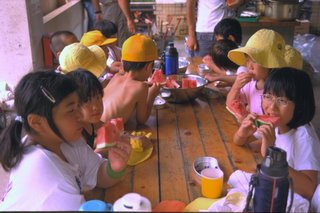 The following images are from a summer camp in Kyoto, Japan, in 2005. Children began imitating an adult who was grinding and smoothing pebbles on boulders, and then began imitating each-other. The children discovered different colours using different stones, and left their markings on the boulders.
The following images are from a summer camp in Kyoto, Japan, in 2005. Children began imitating an adult who was grinding and smoothing pebbles on boulders, and then began imitating each-other. The children discovered different colours using different stones, and left their markings on the boulders. 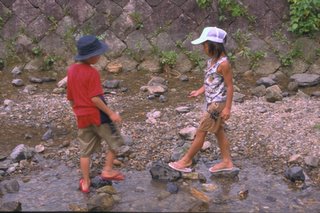
The markings seem to be natural answers to unspoken questions, and signs of science beginning. Is this Art? Is this Writing?
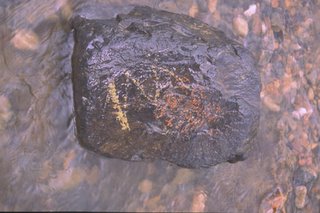
Is this Humanity in Nature (In a Concrete Ditch)?!

With thanks to all the children!
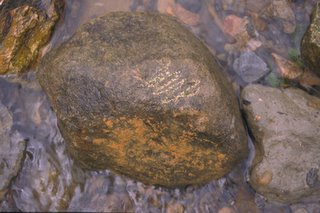
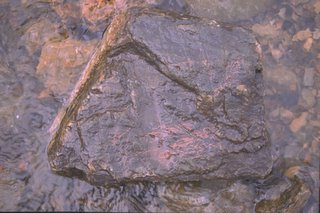
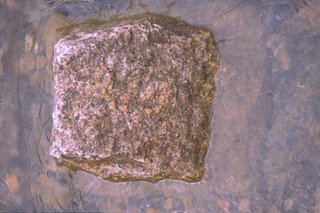
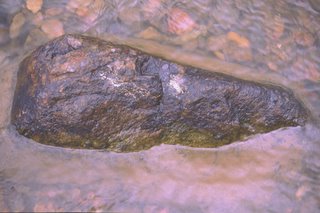

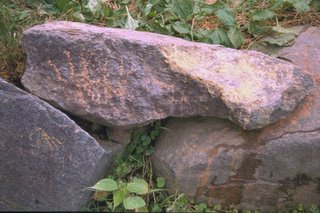
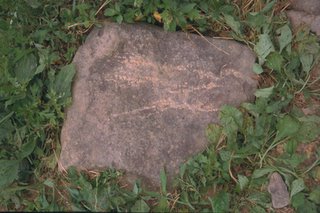
Sunday, February 05, 2006
24 trillion yen
SideLines, February 2006
 That's the five-year spending target announced last week by Japan's General Council on Science and Technology.
That's the five-year spending target announced last week by Japan's General Council on Science and Technology.
The Japan Times of Thursday, Feb. 2, ran a good editorial on the plan, noting that women are greatly underrepresented in the sciences in Japan. According to the new plan, 25 % of newly hired researchers should be women.
Where will they come from?!
Policy suggestions from the Cooperative: spend more on improving scientific writing and publication in Japan, and create courses and job opportunites for professional technicians, so that graduate students and researchers can do their research more effectively.
Subscribe to our electronic newsletter for occasional reports from the Cooperative.
Contact Peter, c/o The Research Cooperative (NZ): pjm (at) gol (dot) com).
 That's the five-year spending target announced last week by Japan's General Council on Science and Technology.
That's the five-year spending target announced last week by Japan's General Council on Science and Technology.The Japan Times of Thursday, Feb. 2, ran a good editorial on the plan, noting that women are greatly underrepresented in the sciences in Japan. According to the new plan, 25 % of newly hired researchers should be women.
Where will they come from?!
Policy suggestions from the Cooperative: spend more on improving scientific writing and publication in Japan, and create courses and job opportunites for professional technicians, so that graduate students and researchers can do their research more effectively.
Subscribe to our electronic newsletter for occasional reports from the Cooperative.
Contact Peter, c/o The Research Cooperative (NZ): pjm (at) gol (dot) com).
Subscribe to:
Posts (Atom)
